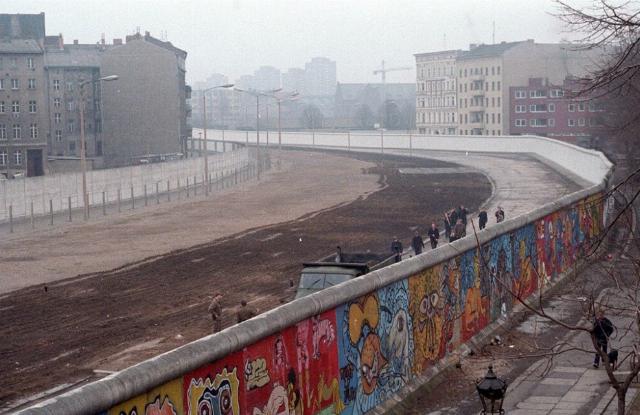Where were you when the Wall fell?
People tend to remember where they were when certain historical events happened: the attack on Pearl Harbor, the shooting of JFK, 9/11. We all remember painful events. Do we remember events worth celebrating — like last night?
Thirty-five years ago, the Berlin Wall fell. Time goes by so quickly that the Berlin Wall has been gone longer than it ever stood. But, to the nearly one thousand people who died on that death strip in Berlin — and the many others elsewhere across the “inner-German border” — its existence cannot and should not be forgotten.
For many in the West, Germans doing disco atop the Brandenburg Gate epitomized a miraculous year that began with semi-free elections in Poland; the fall of the communist regime in Warsaw, when a democratic prime minister took office for the first time since World War II; and the breach of the Iron Curtain between Hungary and Austria. Ten days after the Wall’s collapse, the Velvet Revolution swept away Czechoslovakia’s communist traitors, and by Christmas, Nicolae Ceaușescu and his wife got their just deserts in front of a firing squad. Within two years, the monstrosity called the USSR was gone, a human rights advance that Russia’s KGB colonel president called a geopolitical disaster. (The real geopolitical disaster was not thoroughly lustrating all the socialist countries. As with denazification in postwar Germany, anybody involved in the governments of the communist states should have been permanently barred from public life, their leaders tried and punished.)
The West’s failure to demand a reckoning with the legacy of communism enabled the eventual return to political power of many of the communist elites, who traded political power for economic privilege as their springboards back to government. Americans pretended Russia was a “spent power,” Bill Clinton imagining it was just a capitalist butterfly waiting to sprout from a moldy Soviet cocoon. Russia’s own self-assertiveness was quickly on display: Clinton and his blinkered advisers did nothing as the Russians rushed to assert their position in the Balkans following Bill’s virtue-flexing against Serbia, and they’ve kept going: consolidating influence in Central Asia and Belarus, attacking Georgia and Ukraine, making war in Chechnya, supporting the Iranian mullahs, and carrying on Wagner Group adventurism across Africa. The most significant event, of course, is the alliance of convenience between Russia and communist China.
Nineteen eighty-nine was a miraculous year, but an incomplete year. The failure to reckon with the toxins of socialism and communism are in part responsible for problems of our modern world. But the second great failure of 1989 was the failure of the fight for freedom on Tiananmen Square.
How different would today’s world be if, in June 1989, democracy had also succeeded in China? Whereas socialism began collapsing across central and eastern Europe, some of the most repressive regimes remain in place in East Asia...and it is legitimate to ask how many of them would have survived if the Chinese people had succeeded in consigning the Chinese Communist Party to the dustbin of history.
One can, of course, regret what might have been. Or one can recommit to a modern foreign policy incarnation of Ronald Reagan’s vision that led to the night of November 9, 1989: “we win, they lose.” The return of global geopolitical competition against the United States necessitates such clarity of vision.
But one must also ask whether the cultural strength to do that is there. Following John Paul II, I absolutely believe that economics and politics (including political-military policy) lie downstream from culture. And what we have seen the past few days in our culture, frankly, should be concerning.
People rightly can disagree about politics and political outcomes. But there is something deeply wrong when people take to social media to emote hysterically before a worldwide audience in ways that, in an earlier time, would have brought out straitjackets. As deeply as people may disagree about electoral outcomes, to react to the popular will expressed in a normal presidential election with public self-head-shavings in protest of “lost freedoms” makes one wonder: can this generation claim to be heirs of the people who brought real freedom to the top of the Berliner Mauer 35 years ago last night?

Image: Thierry Noir via Wikimedia Commons, CC BY-SA 3.0.





